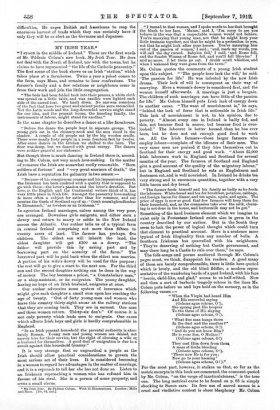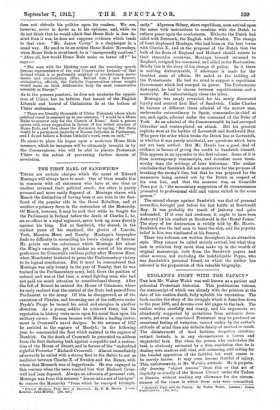MY IRISH YEAR *I &root', in the middle of Ireland."
These are the first words of Mr. -Plidraic Colum's new book, My Irish Year. He does
not- dear-With the North of Ireland, nor with the towns, but he claims to have represented " the life of the Catholic peasantry." 1The first scene of the book shows int an Irish "station," which
takes place at a farmhonse. Twice a year a priest comes to the farm, says Mass, and remains to hear confessions. The armer's family and a few relations or neighbours come in
-from their work and join the little congregation.
"The beds had been folded back into their presses, a white cloth was spread on a little table, and wax candles were lighted each :side of the sacred text. We knelt down, No one was conscious
• of the fact that here two great and ancient pieties were reconciled. Yet the Latin words and the long-descended service might stand Ibr one idea, and the peasant house, the kneeling family, the instruments of labour, might stand for another."
In the same chapter he describes a dance at a like farmhouse.
- "Before the dance the people kept in separate groups. The young girls sat in the chimney-nook and the men stood in the shadow. A couple of old people sat by the big wooden cradle. There were nearly forty people in a room fourteen-feet by twelve. After some dances in the kitchen we shifted to the barn. The floor was clamp, but we danced with great energy. The daaces -were neither graceful nor elaborate."
But though there is much dancing in Ireland there is, accord. ing to Mr. Colum, not very much love-making. In the matter
o f romance 'the Irish are somewhat coolly reasonable. "Born soldiers of-fortune " and " very great "scorners of death," the Irish have a_reputation for gallantry in two senses :— " Because of his conspicuous courage and his impassioned speech t he. Irishman has been credited with a quality that is supposed to go with_these—the lover's passion and the lover's devotion. But love, as the Bnglish and the Continental writers think of it, has -Very little place in Irish life. Amongst the peasantry-love-making is more often a subject for satire than for romance, and our 'cousins -tile Gaels of Suotland say of-us : "Comh neanthghradhinhar le Eireannach; as loveless as' an Irishman. "
In agrarian Ireland marriages, unless among the very poor, are. arranged. Dowerless girls- emigrate, and either earn a dowry and return to marry or settle in the. New Ireland
across the Atlantic. Our author tells us of a. typical farm in central_ Ireland comprising not more' than fifteen to
twenty acres of. land. The- farmer has, perhaps, -five children.. The eldest Ben - inherit_ the land, the
.eldest daughter - will get fil00 • as a dowry. " The father will provide this by saving part= and by
borrowing part on the security' of the farm." The borrowed part will be paid back when the eldest son marries.
A. portion- of his wife's dowry will be used for this purpose; the rest will go to give a start.to. the next son. For the third
'son and the second daughter nothing can be done in the way of money. The boy becomes a .priest-, " a Constabulary man,"
o r a shop-assistant, or he emigrates. The young-daughter, having no hope of ah Irish husband, emigrates at once, Our author' advocates some system of insurance which
might give each daughter a small sum upon her reaching the age of twenty. " Out of forty young men and women who leave this country thirty-eight. swear at- the railivay stations that arecoming back. They- are in earnest - One man
and. three.wouren- return. Thirty-six don't." Of nourse it is not only. poverty which leads men to emigrate. One cause
w hich affects Irish boys and girls is hardly comprehensible in EirgItinch
In an Irish peasant household the parental authority is abso- lutely Roman. Young- men and young women are denied, not merely hire for their service, but the right of choosing a wife o; a husband for themselves. A good deal or emigration is due to a aevolt against this household tyranny" - It is very strange that so unpractical a people as the Irish should allow practical considerations to govern the most serious act of their lives. It is considered becoming in a woman to regard her advantages in the matter of marriage, and it is a reproach to tell her she has not done so. Listen to an Irishman reproaching a woman who has refused him in favour of. his rival. She is a person of some property, and owns a small circus.
lEy Irish' Year. By Pidlnic Colum. With 15 Illustrations. London : Mills and Boon. 1105. 6d. net.]
turned to that woman, and I spoke words to her that brought the blush to her face. Ma'am,' said, I, 'I'm sorry to see you behave in the way that a respectable woman would not behave. You're marrying that young man, not that he might keep your little business together, not that he might be a protection to you, not that he might look after your horses. You're marrying him out of the passion of women,' I said ; 'and, mark my words, you will call the day cursed. Babylon fell,' I said, 'and Rome fell, and the Scarlet Woman of Rome fell, and you'll fall likewise.' I said no more. I let them go out. I drunk small whiskies, and when I wakened they were gone from the town."
Mr. Colum quotes the comments of a young Irish student upon this subject. " The people here lack the will,' he said. The passion for life.' He was infected by the new Irish drama. Their lack of will is consequent on their way of marrying. Here a woman!s dowry- is-considered first, and the woman herself afterwards. A marriage is just a bargain. The children of such marriages can have little of the passion
for life." Mr. Colum himself puts Irish lack of energy down to another cause. " The want of nourishment is," he saysj " behind the lack of force that is noticeable in Irish life." This lack of nourishment is not, in his opinion, due to
poverty. "Almost every, one in Ireland is badly fed, and this, not because food is scarce, but because food is over- looked." The labourer is better housed than he has ever been, but he does not eat enough good food to work on. All the Irish farmers—those larger farmers who employ labour—complain of the idleness of their men. The very same men are praised if they hire themselves out in
Scotland for their energy and good work. "About 25,000 Irish labourers work in, England and Scotland for several months of the year. The farmers of Scotland and England give a good account of the quality of the migratory labour," but in Rngland and Scotland he eats as Englishmen and
Scotsmen eat, and is well nourished. In Ireland he drinks tea, very strong and in enormous quantities, together with a very little bacon and dry bread.
" The farmer feeds himself and his family as badly as he feeds the labourer. White bread and tea for breakfast, potatoes, cabbage, and foreign bacon for dinner, and tea again, again, and again. The price of eggs is now so good that few farmers Will keep them for their household, and, as the creameries take over the milk, °hunt.
ing is not done in the house, -and buttermilk may not be got." _
Something of the hard business element which we imagine to exist only in. Protestant Ireland exists also in germ in the country described. by our author. But in the South they seem to lack the power of logical thought which could turn that element to practical account. Here is a sentence more typical of Irish illogicality. than any number of bulls. A Southern Irishman has quarrelled with his neighbours.
" They're deserving of nothing but Castle government, and may there long be a Castle to rule over them," he says.
The folk-songs and poems scattered through Mr. Colum's pages must, we think, disappoint his readers. A good many
of them are barely comprehensible, there is little here quoted
which is lovely, and the old blind fiddler, a modern repre- sentative of the wandering bards of a past Ireland, with his face "heroic, child-like, and glad," seems to us half-witted. Now and then a sort of barbaric tragedy- echoes in the lines Mr. Colima puts before us and lays hold on the memory, as in the following verses :—
" When the Virgin had heard Him And His sorrowful saying
(Oehone agus ochone, 0 I), She sprang past His keepers- To the three of His slaying (Ochone agus ochone, 0 !).
• What fine man hangs there In the dust and the smother F' (Ochone ague ochone, 0 !) 'And do you not know- Him? He is your Son, 0 Mother !'
(Ochone spas ochone, 0 !) They cast Him down from thank A mass of limbs bleeding (Ochone agus ochone, 0 !). There now He is for you ; Now go to your keening' (Ochone agus ochone, 0 ! ).
For the most part, however, it strikes us that, so far as the
metric excerpts in this book are concerned, the comment quoted by Mr. Colum, "on the verge of inarticulateness," , is the true one. The long metrical curse to be found. on p. 88 is simply
shocking to Saxon ears. Its free use of sacred names in a cruel and vindictive context is- sheer blasphemy Mr. Colas does not obtrude his politics upon his readers. We are,
however, never in doubt as to his opinions, and, while we do not think that he would admit that Home Rule is less de-
sired than it was, be does not suppress evidence which tends to that view. "Mr. James Covey" is a shopkeeper in a -small way. He need-to be an ardent Home Ruler. Nowadays, when Home Rule is mentioned, he is " uriexpectedlycantious." "After all, how would Home Rule make us better off ?" he :Faye :—
• " The man with the blinking eyes and the wavering speech became representative of real Conservative Ireland—of that Ireland which is so profoundly sceptical of revolutionary move- enents and revolutionary ideas. Behind him I saw farmers, 'eeclesiastics, officials, the Catholic Conservatives. whose weight -*mild 'make an Irish deliberative body the most conservative assembly in Europe."
As to the present juncture, he does not minimize the opposi- tion of Ulster, but be believes that hatred of the English
liberals and hatred of Catholicism lie at the bottom of Ulster enthusiasm.
' "There are literally thousands of Ulster Unionists whose whole political creed is summed up in one sentence, ' I would be a Home Ruler to-morrow only for the Church of Rome.' Such a. person agrees with every suggestion in favour of the widest measure of Rome Rule, and then closes the discussion by saying, But there -would be a permanent majority of Roman'Catholics in Parliament, and .I do not believe a Roman Catholic's- word, even on oath.'"
Re seems to place his hopes upon a moderate Home Rule Measure, which he imagines will be ultimately brought in by 'the Conservatives, who will be- able to placate Protestant trlater to the extent of preventing further threats of wevolution.







































 Previous page
Previous page